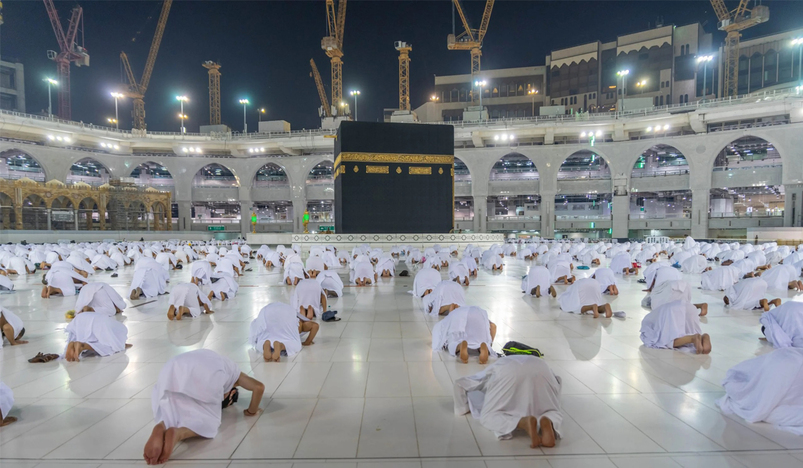
Saudi Arabia will lift outdoor mask mandates except for the excluded places, but still require to wear face coverings indoors.
Saudi Arabia will allow people to move outdoor without either wearing masks or maintaining social distancing effective from Sunday, Oct. 17.
It will also permit entry to the Two Holy Mosques to their full capacity for those worshipers who completed vaccination against coronavirus.
Wedding halls, restaurants and means of transportation will be allowed to operate at their full capacity for the fully vaccinated people without keeping physical distancing.
The decision to ease social distancing requirements will allow commercial outlets to operate to their full capacity but people still require wearing masks indoors.
These are among the decisions approved by Custodian of the Two Holy Mosques King Salman and announced by the Ministry of Interior on Friday as part of further easing COVID-19 restrictions imposed nearly 19 months ago following the outbreak of the coronavirus pandemic in March 2020, the Saudi Press Agency reported.
An official source at the Ministry of Interior stated that the King’s approval for the new decisions was based on recommendations submitted by the competent health authorities, and that is in view of the progress achieved by the Kingdom in herd immunity with a sharp decline in the number of coronavirus cases.
The decisions announced by the ministry are the following:
1- It is not mandatory to wear masks at open places, with the exception of some exempted spaces, but required to wear masks indoors.
2- The precautionary measures for those who received two doses of the coronavirus vaccine are eased as follows:
- Permit to use the full capacity of the Grand Mosque and the Prophet’s Mosque but wearing masks is mandatory for workers and visitors at all times in all the corridors of the mosques. The permit to perform Umrah or prayer at the Grand Mosque or the Rawda Sharif at the Prophet’s Mosque will continue to be issued through taking appointment via Eatmarna or Tawakkalna applications as part of the measures to control the number of the faithful.
- Allowing the use of the full capacity in social gatherings in public places, as well as in restaurants, cinemas, means of transportation and the like, and that is without maintaining social distancing.
- Allowing to holding and attending events in wedding halls and other venues without any number restrictions but emphasizing the application of precautionary measures in view of the seriousness of the behaviors associated with it.
3- Immunization with two doses of vaccine is required to enter all the facilities and activities referred to in the above item number 2, with the exception of those who are not included and those who are given exemption, according to what appears on the Tawakkalna application. They also shall comply with all the precautionary measures, including wearing a mask.
4- Maintaining physical distancing and wearing masks will continue to be applied in locations where health status checks are not applied through the Tawakkalna application.
5- The Public Health Authority (Weqaya) is tasked to prepare preventive protocols that must be adhered to for all the activities mentioned in item 2.
6- All the public and private sector entities shall check the immune health status on the Tawakkalna application for all those who wish to enter their premises. They also have to follow up on compliance with the precautionary measures and preventive protocols taken by the concerned authorities to stem the spread of coronavirus, including wearing a mask.
7- The relevant authorities must take punitive measures against violators of the precautionary measures and preventive protocols announced earlier by the concerned authorities to confront the pandemic.
8- The Ministry of Health would follow up on the number of admitted coronavirus infected cases, especially in intensive care units, and submit report to the concerned authorities in the event of a need to tighten precautionary measures in cities, governorates or regions across the Kingdom.
The official source stressed that these decisions are subject to periodic review in accordance with local and international developments pertaining to the pandemic.
It is noteworthy that the new relaxations in the coronavirus-related restrictions came after a hiatus of 19 months since the Kingdom imposed strict precautionary measures and preventive protocols to stem the spread of coronavirus. It all started with placing temporary ban on Umrah pilgrims on Feb. 27, 2020 and later it suspended domestic and international flight services along with shutting down all the activities of public life with imposition of curfew.
.jpg)
Qatar Secures Place Among the World's Top 10 Wealthiest Nations
.jpg)
Hamad International Airport Witnesses Record Increase in Passenger Traffic

Saudi Arabia: Any visa holder can now perform Umrah

What are Qatar's Labour Laws on Annual Leave?
Leave a comment